Number 734 - Lonnie Donegan
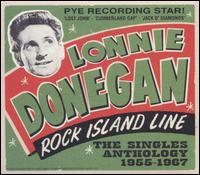
Number 734
Lonnie Donegan
"Tom Dooley"
(1958)
.
.
Genre:Skiffle
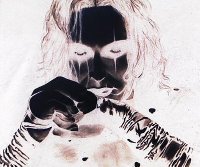 When John Lennon heard this style of music thats when he knew he wanted to be in a band. The Beatles even started their own "Skiffle" group "The Quarry Men" before they even became "The Siver Beatles". Lonnie's song "Tom Dooley" is a classic and is very catchy indeed and never fails to get people singing this in the car on a long drive. I wonder if anyone has done this as a re-make yet? I would gamble yes, without even having to check.
When John Lennon heard this style of music thats when he knew he wanted to be in a band. The Beatles even started their own "Skiffle" group "The Quarry Men" before they even became "The Siver Beatles". Lonnie's song "Tom Dooley" is a classic and is very catchy indeed and never fails to get people singing this in the car on a long drive. I wonder if anyone has done this as a re-make yet? I would gamble yes, without even having to check. 29 April 1931 – 3 November 2002
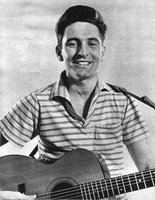 To look at Lonnie Donegan today, in pictures taken 40 years ago when he was topping the British charts and hitting the top Ten in America, dressed in a suit, his hair cut short and strumming an acoustic guitar, he looks like a musical non-entity. But in 1954, before anyone (especially anybody in England) knew what rock 'n roll was, Donegan was cool, and his music was hot. He's relatively little remembered outside of England, but Donegan shares an important professional attribute with Elvis Presley, Bill Haley, the Beatles, the Rolling Stones, and the Sex Pistols -- he invented a style of music, skiffle, that completely altered the pop culture landscape and the youth around him, and for a time completely ruled popular music through that new form. What's more, his music, like that of Presley and Haley, was vital to the early musical careers and future histories of the Beatles, the Stones, and hundreds of other groups. And he did it in 1954, before Elvis was known anywhere outside of Memphis and before Bill Haley was perceived as anything but a western swing novelty act.
To look at Lonnie Donegan today, in pictures taken 40 years ago when he was topping the British charts and hitting the top Ten in America, dressed in a suit, his hair cut short and strumming an acoustic guitar, he looks like a musical non-entity. But in 1954, before anyone (especially anybody in England) knew what rock 'n roll was, Donegan was cool, and his music was hot. He's relatively little remembered outside of England, but Donegan shares an important professional attribute with Elvis Presley, Bill Haley, the Beatles, the Rolling Stones, and the Sex Pistols -- he invented a style of music, skiffle, that completely altered the pop culture landscape and the youth around him, and for a time completely ruled popular music through that new form. What's more, his music, like that of Presley and Haley, was vital to the early musical careers and future histories of the Beatles, the Stones, and hundreds of other groups. And he did it in 1954, before Elvis was known anywhere outside of Memphis and before Bill Haley was perceived as anything but a western swing novelty act. 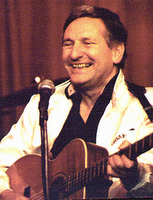 He continued to record sporadically during the 1960's, including some sessions at Hickory Records in Nashville with Charlie McCoy, Floyd Cramer, and the Jordanaires, but after 1964, he was primarily occupied as a producer for most of the decade at Pye Records. Among those he worked with during this period was future Moody Blues guitarist-singer Justin Hayward. Donegan's attempt at a recording comeback late in the 1960's was unsuccessful, but in 1974, a new boomlet for skiffle music in Germany brought him on tour and into the studio anew, and the following year he and Chris Barber toured together and recorded a new long-player, The Great Re-Union Album. In 1976, however, after another series of shows and recordings in Germany, Donegan suffered a heart attack that left him sidelined, and he moved to California to recuperate.
He continued to record sporadically during the 1960's, including some sessions at Hickory Records in Nashville with Charlie McCoy, Floyd Cramer, and the Jordanaires, but after 1964, he was primarily occupied as a producer for most of the decade at Pye Records. Among those he worked with during this period was future Moody Blues guitarist-singer Justin Hayward. Donegan's attempt at a recording comeback late in the 1960's was unsuccessful, but in 1974, a new boomlet for skiffle music in Germany brought him on tour and into the studio anew, and the following year he and Chris Barber toured together and recorded a new long-player, The Great Re-Union Album. In 1976, however, after another series of shows and recordings in Germany, Donegan suffered a heart attack that left him sidelined, and he moved to California to recuperate. 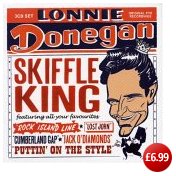 Lonnie Donegan remains a beloved pioneer of English rock 'n roll, and the king of skiffle. In the late '90s, his musical credibility came around again to perhaps the highest level of respect of his life, with several multi-disc hits and career-wide compilations available. Donegan passed away November 3, 2002, following heart problems. Unlike a lot of American rock & roll of the mid-'50s, and even more British attempts at the music from the same period and after, Donegan's music remains eminently enjoyable and enlivening. ~ [Bruce Eder]
Lonnie Donegan remains a beloved pioneer of English rock 'n roll, and the king of skiffle. In the late '90s, his musical credibility came around again to perhaps the highest level of respect of his life, with several multi-disc hits and career-wide compilations available. Donegan passed away November 3, 2002, following heart problems. Unlike a lot of American rock & roll of the mid-'50s, and even more British attempts at the music from the same period and after, Donegan's music remains eminently enjoyable and enlivening. ~ [Bruce Eder]Roll call .....
For John Lennon see Number 492 & #639 For the Beatles see Number 489, #587, #894 & #947
For Elvis Presley see Number 443, #501 & #840
For Rolling Stones see Number 767 & Number 689
For Cliff Richard see Number 739 & Number 666 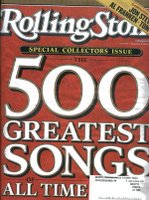 What does Rolling Stone think about Lonnie Donegan?
What does Rolling Stone think about Lonnie Donegan?
Even more notably for rock & roll fans, the song prompted the young George Harrison and John Lennon to pick up the guitar. "Lonnie Donegan was a much bigger influence on rock than he was ever given credit for," Harrison wrote in his autobiography, I, Me, Mine. "He was a big hero of mine."
Aside from the Beatles (who began as the skiffle-minded Quarrymen), other British Invasion members had their roots in skiffle bands: the Who (the Detours), Van Morrison (the Sputniks) and Graham Nash (Two Teens). Ironically, after Donegan's disciples found fame in the mid-Sixties, his own popularity waned and he recorded only sporadically. In 1978, Elton John, Ringo Starr, Ron Wood, Brian May and others joined him for his comeback album, Putting on the Style. Donegan also released The Skiffle Sessions: Live In Belfast 1998, a concert album with Barber and Van Morrison in 2000. ~ [Source: Rolling Stone]
For the Sex Pistols see Number 500
 What does Rolling Stone think about Lonnie Donegan?
What does Rolling Stone think about Lonnie Donegan?Even more notably for rock & roll fans, the song prompted the young George Harrison and John Lennon to pick up the guitar. "Lonnie Donegan was a much bigger influence on rock than he was ever given credit for," Harrison wrote in his autobiography, I, Me, Mine. "He was a big hero of mine."
Aside from the Beatles (who began as the skiffle-minded Quarrymen), other British Invasion members had their roots in skiffle bands: the Who (the Detours), Van Morrison (the Sputniks) and Graham Nash (Two Teens). Ironically, after Donegan's disciples found fame in the mid-Sixties, his own popularity waned and he recorded only sporadically. In 1978, Elton John, Ringo Starr, Ron Wood, Brian May and others joined him for his comeback album, Putting on the Style. Donegan also released The Skiffle Sessions: Live In Belfast 1998, a concert album with Barber and Van Morrison in 2000. ~ [Source: Rolling Stone]
For George Harrison see Number 806
For the Who see Number 556
For Van Morrison see Number 987
For Graham Nash see Number 660
For Elton John see Number 531
For Ringo Starr see Number 901
Rolling Stone Top 500 Songs ranked this song at Number (Zip) and the album ranked at (Nah uh)
This song has a crowbarred rating of 66.9 out of 108
Tags: Lonnie Donegan, Skiffle, 1958, John Lennon, Quarrymen, Silver Beatles, Elvis Presley, Bill Haley, Beatles, Rolling Stones, Sex Pistols, Tommy Steele, Cliff Richard, Gerry & The Pacemakers, The Searchers, Floyd Cramer, Moody Blues, Justin Hayward, Van Morrison, The Who, Elton John, Ringo Starr, Ron Wood, Brian May, Music, Youtube, Music Video, Rolling Stone Magazine, The Definitive 1000 Songs of all TimeVideo
Search by Genre: ALT POP-ALT PUNK-ALT ROCK-ALTERNATIVE-BIZARRE-BLUES-BRIT POP-COMEDY-COUNTRY-CROONER-DANCE-DISCO-DO WOP-ELECTRONIA-FOLK SINGER-FOLK ROCK-FUNK-GARAGE ROCK-GLAM ROCK-GOSPEL-GRUNGE-GUITARIST-HAIR ROCK-HARD ROCK-HIP HOP-INDIE POP-INDIE ROCK-INDUSTRIAL ROCK- INSTRUMENTAL-JAZZ-LAZY SUNDAY-NEW WAVE-NU ROCK-POP-POP ROCK-PROG ROCK-PSYCHEDELIC ROCK-PUNK POP-PUNK ROCK-R&B-RAP-REGGAE-ROCK-ROCK N ROLL-SINGER SONGWRITER-SKA ROCK-SKIFFLE-SOFT ROCK-SOUL-SOUTHERN ROCK-SURF ROCK-SYNTH POP-TENOR-VOCAL
By The Year 1955 to 2005:
1955, 1956, 1957, 1958, 1959, 1960, 1961, 1962, 1963, 1964, 1965, 1966, 1967, 1968, 1969, 1970, 1971, 1972, 1973, 1974, 1975, 1976, 1977, 1978, 1979, 1980, 1981, 1982, 1983, 1984, 1985, 1986, 1987, 1988, 1989, 1990, 1991, 1992, 1993, 1994, 1995, 1996, 1997, 1998, 1999, 2000, 2001, 2002, 2003, 2004, 2005

underlay trademe
Labels: Lonnie Donegan

















0 Comments:
Post a Comment
<< Home